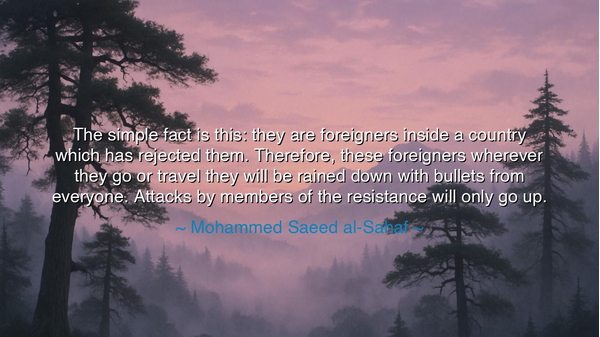
The simple fact is this: they are foreigners inside a country
The simple fact is this: they are foreigners inside a country which has rejected them. Therefore, these foreigners wherever they go or travel they will be rained down with bullets from everyone. Attacks by members of the resistance will only go up.






Mohammed Saeed al-Sahaf, remembered in history as the “Baghdad Bob” of the Iraq War, once declared with fiery conviction: “The simple fact is this: they are foreigners inside a country which has rejected them. Therefore, these foreigners wherever they go or travel they will be rained down with bullets from everyone. Attacks by members of the resistance will only go up.” Though these words were spoken in the chaos of war, they reveal an ancient truth about the power of belonging, the fury of rejection, and the unyielding strength of people defending their land.
The heart of his statement lies in the word foreigners. Throughout history, those who enter lands not their own without invitation become symbols of intrusion. They may come with armies or with laws, with crowns or with flags, but to the people of the soil, they are outsiders. When a country rejects them, no comfort, no alliance, no settlement can shield them. They will forever be marked as alien, and hostility will follow them as faithfully as a shadow follows the body. Thus, al-Sahaf’s words, though born of propaganda, echo the timeless cry of peoples who resist the presence of the uninvited.
He speaks, too, of the inevitability of bullets. This image is not merely literal—it is symbolic of resistance in all forms. When a people reject the outsider, every street becomes dangerous, every corner a battlefield, every heart a weapon. History is filled with such moments. In Afghanistan, empires from Britain to the Soviet Union to America found that mountains and villages turned against them. In Vietnam, foreign troops marched into jungles only to be met with relentless attacks. The soil itself seems to rise against those who impose upon it.
The resistance, as al-Sahaf names it, is not only a group of fighters. It is the embodiment of a people’s spirit. When hearts are united by rejection of the invader, every man, woman, and child becomes a potential thorn in the side of the outsider. We see this in the Jewish resistance of Masada, where a small band defied the might of Rome. We see it in the French Resistance of World War II, where farmers, merchants, and teachers took up arms or whispers against occupation. The resistance grows not from power, but from the refusal to bow.
And yet, there is also tragedy in these words. For while they reveal the determination of the people, they also prophesy endless violence. The bullets falling from “everyone” are a sign that war consumes both soldier and civilian. The innocent suffer alongside the guilty, the young alongside the old. The cycle of rejection and resistance, of attack and retaliation, becomes a storm that spares no one. Thus, his words remind us of both the dignity of defending one’s homeland and the terrible cost of prolonged conflict.
The deeper teaching is this: no people can be ruled by force forever. To be foreign in a land that does not welcome you is to walk perpetually in danger. Empires may rise, but if they ignore the will of the people, they sow the seeds of their own downfall. Rome learned this in Judea. Napoleon learned this in Spain. Every conqueror who ignored the strength of rejection found themselves broken by the resistance.
So what lesson must we take? It is this: respect the sovereignty of peoples and nations. Do not presume to impose where hearts have not consented. For even the smallest community, if united in rejection, becomes unconquerable. At the same time, let us recognize the cost of endless resistance: the suffering of innocents, the waste of life, the rivers of sorrow. The wise course is not domination, but understanding; not occupation, but respect.
Practical counsel follows: if you lead, lead with consent, not compulsion. If you travel to another land, do so with humility, not arrogance. If you find yourself in conflict, remember that the strength of a people is not in their armies but in their spirit. And above all, remember this truth: a country rejected becomes a battlefield, but a country respected becomes a home.






AAdministratorAdministrator
Welcome, honored guests. Please leave a comment, we will respond soon